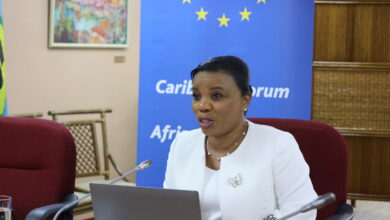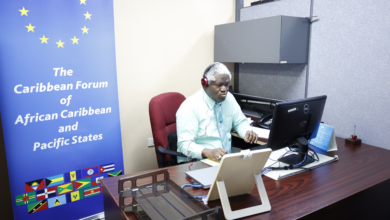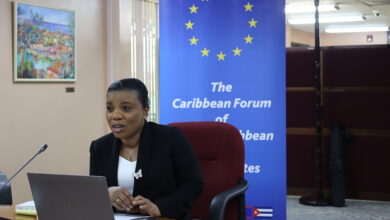CHRIST CHURCH, BARBADOS – Senior Caribbean and European Commission (EC) officials met in Barbados today, November 12. The encounter marked the Second Meeting of CARIFORUM-EC Principal Negotiators; the first having been convened in Brussels, July 15, 2004.
CARIFORUM officials were led by Ambassador Dr. Richard Bernal, Director General of the Caribbean Regional Negotiating Machinery (RNM) and Caribbean Principal Negotiator on Economic Partnership Agreement (EPA), and the EC team was headed by Mr. Karl Falkenberg, Director DG-Trade.
The significance of the meeting is that it represents the formal launch of the second phase of CARIFORUM-European Union (EU) EPA negotiations. As such, this phase will seek to establish a common understanding on the priorities for support of Caribbean regional integration, and the targets to be attained by the time of the commencement of implementation of the EPA on January 1, 2008 and beyond.
In keeping with the Joint Plan and Schedule for negotiations, the meeting made good progress on its three agenda items: (i) CARIFORUM Regional Integration Process, (ii) Structure and Schedule of CARIFORUM-EC Negotiations, and (iii) Modalities and Work Programme for the Joint Regional Preparatory Task Force (RPTF).
Based on the common understanding of EPAs as an instrument for sustainable development, there was wide-ranging and extensive exchange of views on CARIFORUM regional cooperation and integration, namely as it relates to: the CARICOM Single Market and Economy (CSME), the fuller integration of Haiti into CARICOM, the CARICOM-Dominican Republic FTA, institutional framework and capacities to manage adjustment and other related intra-Caribbean issues.
Ambassador Bernal explained that there are two related aspects of the regional integration process in CARIFORUM. “The first is built around the CARICOM integration process, and the second is the CARICOM-Dominican Republic Free Trade Agreement,” he said. On the first aspect, Dr. Bernal noted that at their Tenth Special Meeting, November 8 to 9, “the Heads recommitted to completing core elements of the CARICOM single market by 2005, indicating there is to be no slippage in the existing schedule.”
Mr. Falkenberg added, “better knowledge and understanding of CARIFORUM regional integration will give us the starting point for negotiations on an EPA that will support integration and development in the Caribbean.” The EC team was especially focused on clarifying the framework of the CARICOM customs union, elements of the single market to be signed off on by CARICOM Member States in 2005 and situating Haiti and the Dominican Republic in the regional integration context.
The two sides considered and agreed to the schedule for the second phase of CARIFORUM-EC negotiations.
CARIFORUM and the EC expressed satisfaction with the signing of a Memorandum of Understanding (MoU) on the Internal Organisation of the Joint RPTF. In this regard, they welcomed the work of the First Meeting of the CARIFORUM-EC RPTF in advancing the document, November 11. This First Meeting discussed the modalities and work programme and in this regard the role and functions of the RPTF, acknowledging that it is envisioned that the Task Force would be guided by the decisions of the Principal Negotiators. There was the shared view that the initial undertakings in regards to a work programme of the RPTF should be geared towards building an inventory of studies that currently exist, that might impact on the work of the Principal Negotiators. In addition, the building of an inventory of donor funded programmes regarding trade and integration-related areas was also identified as a priority.
Viewed as a mechanism that is a key link between the development and trade components of the EPA, the RPTF will support the negotiating process, by providing advice to the Principal Negotiators. The Plan and Schedule sets out specific tasks guided by four phases, which will be the basis for the RPTF to move forward on.
The Meeting of Principal Negotiators also discussed recent developments regarding the EU regimes for commodities such as bananas and sugar, given their importance for the Caribbean region.
In addition, the EC provided an update on its proposal for a new Generalized System of Preferences (GSP) and on the simplification and re-orientation of rules of origin regimes of the EU.
Allied to CARIFORUM-EU EPA negotiations, the ‘Caribbean Non-State Actors Forum’ is slated to be launched tomorrow, November 13.
Background
There are four phases to the schedule of EPA negotiations that will guide interchange between CARIFORUM and the EC, namely: I) Initial Phase: Establishing the Priorities of EPA Negotiations (April 2004 to September 2004) – the objective of this phase is to establish an understanding of the fundamental concerns and interests of EPA negotiations for both CARIFORUM and the EC; ii) Second Phase: Convergence on strategic approach to CARIFORUM regional integration (September 2004 to September 2005) – the aim of EPA negotiations during this phase will be to establish a common understanding on the priorities for support of Caribbean regional integration, and the targets to be attained by the time of the commencement of implementation on January 1, 2008 and beyond; iii) Third Phase: Structuring and consolidating of EPA negotiations (September 2005 to December 2006) – the objective of this phase of negotiations is to consolidate the discussions and channel the points of common understanding into elements of a draft EPA; and, iv) Final Phase: Finalisation (January 2007 to December 2007) – negotiations during this final phase should concentrate on consolidating the results of the negotiations and completing the EPA negotiations by the end of 2007.
The ACP-EU Partnership Agreement (Cotonou Agreement), signed in Cotonou in June 2000, establishes a comprehensive framework for ACP-EU relations. At the centre of the partnership are economic development, the reduction and eventual eradication of poverty, and the smooth and gradual integration of ACP States into the world economy. In order to accomplish these objectives, the Cotonou Agreement provides for the conclusion between the ACP and the EU of new World Trade Organisation (WTO) compatible trading arrangements. The process began with engagement at the All ACP-EC level. Negotiations for a CARIFORUM-EU EPA were launched in Kingston, Jamaica, April 16, 2004.
For the purposes of these negotiations, the Caribbean Forum of ACP States (CARIFORUM) represents the regional configuration of the following countries – Antigua and Barbuda, The Bahamas, Barbados, Belize, Commonwealth of Dominica, Dominican Republic, Grenada, Guyana, Haiti, Jamaica, St. Kitts and Nevis, Saint Lucia, St. Vincent and the Grenadines, Suriname, and Trinidad and Tobago.
European UnionPress Releases





